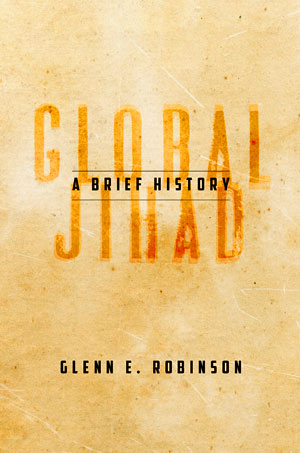
In Global Jihad I make two unique arguments. First, I provide an interpretive history of this important movement by showing how there have been four distinct iterations, or “waves”, of global jihad since it began in the 1980s. Each wave had its own distinct crisis that initiated it, and its own peculiar ideological vision for the path ahead. In each case, the fundamental problem was seen as systemic to the international system, which is why they are examples of global jihad.
The first wave, in response to the Soviet invasion and occupation of Afghanistan in the 1980s, focused on liberating occupied Muslim territory around the world; it was led by a pious warrior class I term a “Jihadi International”.
The second wave, led by Usama Bin Laden and al-Qa’ida, sought to drive the Americans out of the Middle East as part of an “America First” campaign that would lead to the easier overthrow of local apostate regimes.
ISIS’s state-building campaign, the third wave, sought to eliminate apostasy by creating a puritanical and globalized caliphate in the heart of the Middle East.
The fourth and current wave of global jihad is focused on the survival of global jihad through “jihad fardi”—personal terror attacks undertaken by individuals and small groups who are connected online by a shared ideology but whose attacks are autonomously orchestrated. This form of “stochastic terror” was initiated by white nationalists who, with the birth of the internet, realized they could influence and connect with the audience without ever having any logistical connection in the planning and execution of violent acts. Global jihadis have made full use of this “inspired terrorism”, the acts of which are stitched together in an ever-evolving wiki-narrative by an online jihadi community.
The second big argument I make is to situate global jihad in the universe of all violent political groups over the past century. I borrow and build on the theory of “movements of rage” to suggest that there is a unique form of political violence that is marked by calls to nihilistic violence and that adopt apocalyptic ideologies. Both religious and secular groups can constitute movements of rage, from global jihad to white nationalism. Movements of rage are usually small and weak, and rarely come to power. But when they do seize power, such as the Khmer Rouge in Cambodia, the results can be devastating.
Readers primarily interested in the history of global jihad from the 1980s to the present can focus on the Introduction and first four chapters. Those mostly interested in the current wave of global jihad can focus on Chapter Four, Personal Jihad, in which a networked system using the internet and social media has replaced old-fashioned organizations to make for a much more durable form of violence. And for those readers more attuned to scholarly arguments about terrorism and other forms of political violence, the concluding chapter on movements of rage will hold the most interest.
There are two main audiences for this book. First, anyone interested in the history of the global jihad movement, including its intellectual precursors, its development, its ideologies, and its structural weaknesses should read it. I present both my own translations and interpretations of original Arabic documents and share the insights of the best scholarly work on the subject in a short and accessible book meant for a wide audience.
The second audience includes anyone interested in issues of political violence. The concluding chapter on “movements of rage” is a broad discussion on the various forms of political violence and how they have been categorized and understood by different scholars.
The vast majority of political violence undertaken over the past century has been based on Enlightenment ideals. Those on the Left argued that revolutionary violence often represents the forward and scientific march of history, including the overthrow of feudal and repressive monarchies from France to Russia. New and more progressive societies are the outcomes of such social revolutions. Fascists and others on the Right have also often espoused political violence as a means for the conservative modernization of society, to “make the trains run on time”, in Mussolini’s famous phrasing. National liberation movements in the post-World War II period often justified political violence in the name of greater freedom and liberty.
By contrast, I argue that there is a small subset of violent political groups that are antithetical to Enlightenment ideals. They espouse nihilistic violence—in the political sense of the word that comes from the Russian anarchists of the 19th century—that is system-destroying; not surgical violence for more modest outcomes. Movements of rage also adopt apocalyptic ideologies that see a cosmic struggle between good and evil, which always have as a feature the notion of cultural contamination by outsiders and Fifth Columnists. By using a movement of rage lens, I can make valuable comparisons of global jihadis to the white nationalists today as well as earlier groups such as the Khmer Rouge, Red Guards, and Brownshirts in Germany.
This book represents a natural culmination of intellectual interests and experiences I have had in life. I first caught interest in issues of political violence as an American exchange student living in Iran in 1978 as the revolution to overthrow the Shah was launched. Later, for my dissertation at Berkeley, I detailed the first Palestinian uprising against Israel’s continued occupation of the West Bank and Gaza, which became the basis of my first three books and many essays. Other research conducted in Syria, Yemen, and South Sudan continued my focus on political violence, its root causes, and its various manifestations. The terror attacks on 9/11 and subsequent wars in the Middle East led me to write this book, to capture in one accessible volume the most important aspects of this new phenomenon of global jihad.
A “just browsing” reader would be well-served by reading the very short, 3-page Preface to get a better sense of what the whole book is about. Indeed, the scope of the book is laid out in the first one and a half pages! That same browser could then usefully skip to the back of the book and read the short, 4-page Epilogue entitled “Who Won?” to better understand the exaggerated impact global jihad has had on America, especially since 9/11. America was so devastated by 9/11—and understandably so—that it adopted policies at home and abroad that represented both a vast exaggeration of the nature of the threat, and an essential misunderstanding of the dynamics of global jihad. Hopefully, this book will act as a corrective to both these shortcomings.
But the whole book is accessibly written and under 200 pages of text, so the browser would be well-served to read the whole book!
I am humbled by the fact that the book is already being hailed as a major contribution to our knowledge not only of the global jihad movement but of Middle East politics more generally. While I hope such positive reviews continue, I have three primary goals for this book. First, after four decades of global jihad, and two decades since the attacks on 9/11, I hope this book becomes the “go-to” book on global jihad. For anyone who wants to understand ISIS and al-Qa’ida or similar groups, this is the book they consult first and perhaps last. I hope that it is seen as the best summary study of global jihad for students and the general public to read for years to come. It not only provides the history of global jihad, but also an interpretation of how to best understand that history.
Second, I would like this book to have an impact on the discussions in terrorism studies and broader conversations over political violence concerning the role that the concept of “movements of rage” can play in understanding certain forms of political violence. Conceptualizing such anti-Enlightenment groups as forming a movement of rage can help us more accurately understand the ideologies and organizational structures of such groups, as well as their likely resort to violence.
Third, this book should have an impact in the policy realm, where dealing with global jihad groups and other movements of rage is a major policy concern. Policy makers need to be aware of the variations in global jihad groups, and they need to understand how the current fourth wave of global jihad is quite distinctive from earlier waves. Helping to gauge the overall level of threat from global jihad flows naturally from the concerns in this book. And, moving beyond global jihad groups, policy makers should be aware of the concept of movements of rage and how policies vis-à-vis these groups must by nature be quite distinct from the usual counter-terror type actions.


Glenn E. Robinson is on the faculty at the Naval Postgraduate School in Monterey, California, and is affiliated with the Center for Middle Eastern Studies at the University of California at Berkeley. He is the author or co-author of four books on Middle East politics, and over 150 journal articles, book chapters, conference papers and government reports. He earned his doctorate in political science from Berkeley in 1992. Robinson has lived, studied, worked in, and visited virtually every country from Morocco to Malaysia.